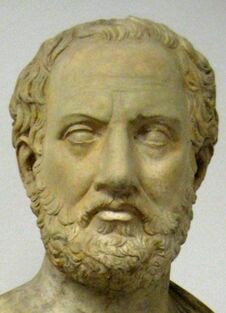 Herbert and Yeats Zbigniew Herbert’s “Why the Classics” (http://www.uvm.edu/~sgutman/Herbert.html) has called out to me for a long while, as did W.B. Yeats’ “Sailing to Byzantium” until I wrote about it. And so I am writing about Herbert’s poem that gives its history lesson by pulling the reader into the here and now. I will be drawing on several translations of the poem. Yeats’ instructs by displaying for the reader Yeats’ golden perch outside history. Herbert plants feet in a hotel room and then by creating a map of sorts (he calls it “wall-paper”) using Thucydides’ place and moment thousands of years ago in Greece, using his own time during and immediately after WWII in Poland as his moment, and therefore suggesting our moment and place. What intrigues me in this poem is not only the scope, its reach, but his bringing in acting or behavior and the classics when writing on the cusp of postmodern culture. My discovery and Its Impact Derek Walcott called my attention to the poem in the early or mid-eighties when talking about Joseph Brodsky. He wanted me to appreciate the idea of Brodsky’s exile from the USSR for his art and the exile’s great cost to the poet and man. We both liked the idea of the “wall-paper” dawning in the poem. If I remember correctly, he liked that it took the place of the sun. I have used the poem in poetry classes and left the students in the prison-like hotel room as one of the lovers. However I have always come back to the details of the poem: “the pin / in a forest,” “what price it is,” “he sailed quickly,” “a broken jar,” “small” (used twice), and “wall-paper dawns.” I keep coming back to the idea of wall-paper (and its various patterns) and acting and the details that lead to the mention of the hotel and the primal Eden couple. I am attracted to Herbert’s possible answer to his questioning “what will remain after us” and his title for the poem at the beginning of the postmodern era. I would bet that he was looking into the future, one where a privileged population had little or no memory of difficult times. What reminded me of the wall-paper was my recent use in class of Paul Klee’s Angelus Novus and Walter Benjamin’s interpretation of the painting. Benjamin’s interpretation conflicts with Herbert’s wall-paper in that Herbert is encouraging noble behavior or acting with humility in the face of failure, while Benjamin’s interpretation merely suggests the helpless making of historic catastrophe by the West when attempting to make progress. Czeslaw Milosz kindly refers to those attempting progress and the helpless as “co-creator[s] of the unintended.” But maybe Benjamin and Klee could help us bring about better results in the wall-paper? (For more on Paul Klee and Walter Benjamin go to https://www.davidzwirner.com/artists/paul-klee and https://www.sfu.ca/~andrewf/CONCEPT2.html). Thucydides, Generals, You and Me Herbert’s use of language reminds me of a GPS informing the reader of the historical moment, reminding the reader that s/he is embedded in history, puts the reader in the hotel room as one of the lovers. I am taken with his focusing the reader on “lovers’ weeping” in that dirty hotel. The affair in the hotel isn’t a purchase of sex; in fact, sex may not have even taken place. Is the weeping with joy or the end of the affair? It may not matter. When the wall-paper dawns, how will this couple act? Herbert seems to imply that the weeping needs to stop or at least put into perspective given the pattern of the wall-paper of the dirty hotel. Perhaps the lovers are to shepherd into being a character or persona of humility, an appreciation for the moments in the dark, and in the morning recognize the significance of the situation. Certainly, as in Benjamin’s interpretation of the painting, nothing can be done to rescue the earlier moment and have the illusion of love last forever. Perhaps the suggestion is, “Act with humility when attempting to change the course of history.” Acting in History The poem suggests that there is a way of acting or behaving, encouraging the reader to put his failure and consequences into historical perspective, remembering that it should be a pin in a forest in his narrative. Acts should not become the victim of unfavorable winds: Whining, accusing, and self-praise. One should act as the pre-modern, Greek Thucydides had as both a responsible party and artist of history. Herbert seems to put an emphasis on embedding one’s situation and actions on the dirty wall-paper of history before one speaks or makes another move. The poem suggests that the classics can help us with that task. If one considers where we are today with regime change wars, 800+ military bases around the world, the rise of white supremacy, and the corruption in American politics in general, one can see how troubling our situation is. I don’t know what Thucydides would write, but when one considers Hebert’s wall-paper, Edward Snowden, the whistle-blower and exile who spoke truth to power, is more apt to be Thucydides.
0 Comments
Leave a Reply. |
Archives
May 2024
Categories |

 RSS Feed
RSS Feed